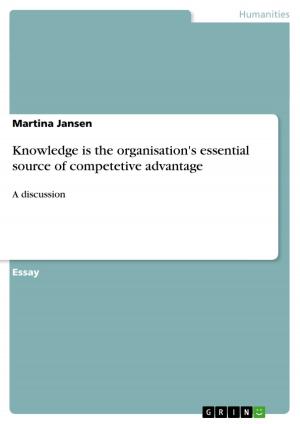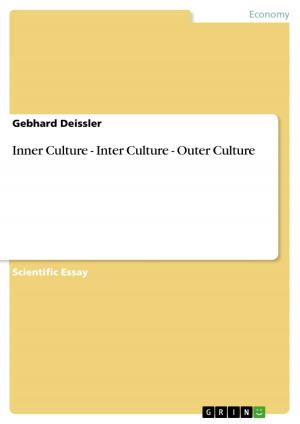| Author: | Anonymous | ISBN: | 9783638266031 |
| Publisher: | GRIN Publishing | Publication: | April 7, 2004 |
| Imprint: | GRIN Publishing | Language: | English |
| Author: | Anonymous |
| ISBN: | 9783638266031 |
| Publisher: | GRIN Publishing |
| Publication: | April 7, 2004 |
| Imprint: | GRIN Publishing |
| Language: | English |
Seminar paper from the year 2003 in the subject American Studies - Literature, grade: 1, Southern Connecticut State University (English Department), course: Wright, Ellison, and Baldwin, 11 entries in the bibliography, language: English, abstract: Richard Wright is the author, narrator, and protagonist of Black Boy. Growing up in an abusive family environment in the racially segregated and violent American South, Richard finds his salvation in reading, writing, and thinking. He grows up feeling insecure about his inability to meet anyone's expectations, particularly his family's wish that he accept religion. Even though he remains isolated from his environment and peers, at the autobiography's end Richard has come to accept himself. The book literally throbs with the passionate expression of a young boy who lived through hell and agony, through trauma after trauma, who escaped into books and continually sought to know the meaning of his life. [...] He is seeking most of all to find and know himself - his true identity (Walker 190). Charles T. Davis identifies three themes in Black Boy. The first is survival, the second theme is the making of the artist and the third theme is didacticism characterized by social purposefulness (432). Richard Wright's most essential characteristic may be his tremendous belief in his own worth and capabilities. This belief frequently renders him willful, stubborn, and disrespectful of authority, putting him at odds with his family and with those who expect him to accept his degraded position in society. Because almost everyone in Richard's life thinks this way, he finds himself constantly punished for his nonconformity with varying degrees of physical violence and emotional isolation. Richard Wright continually faces a world that relies on force, rather than sound judgment and truth. Richard is cursed, beaten, or slapped every time he stands up to Granny, Addie, or other elders, regardless of how justified he may be in doing so. Robert Felgar argues that the book's entire plot is about 'self-proclaimed innocence meet[ing] with a brutal response at nearly every tur n' (63). According to him, Richard lives in world that 'readily substitutes emotion for thought', making Black Boy 'a plea for rationality over physicality' (73). [...]
Seminar paper from the year 2003 in the subject American Studies - Literature, grade: 1, Southern Connecticut State University (English Department), course: Wright, Ellison, and Baldwin, 11 entries in the bibliography, language: English, abstract: Richard Wright is the author, narrator, and protagonist of Black Boy. Growing up in an abusive family environment in the racially segregated and violent American South, Richard finds his salvation in reading, writing, and thinking. He grows up feeling insecure about his inability to meet anyone's expectations, particularly his family's wish that he accept religion. Even though he remains isolated from his environment and peers, at the autobiography's end Richard has come to accept himself. The book literally throbs with the passionate expression of a young boy who lived through hell and agony, through trauma after trauma, who escaped into books and continually sought to know the meaning of his life. [...] He is seeking most of all to find and know himself - his true identity (Walker 190). Charles T. Davis identifies three themes in Black Boy. The first is survival, the second theme is the making of the artist and the third theme is didacticism characterized by social purposefulness (432). Richard Wright's most essential characteristic may be his tremendous belief in his own worth and capabilities. This belief frequently renders him willful, stubborn, and disrespectful of authority, putting him at odds with his family and with those who expect him to accept his degraded position in society. Because almost everyone in Richard's life thinks this way, he finds himself constantly punished for his nonconformity with varying degrees of physical violence and emotional isolation. Richard Wright continually faces a world that relies on force, rather than sound judgment and truth. Richard is cursed, beaten, or slapped every time he stands up to Granny, Addie, or other elders, regardless of how justified he may be in doing so. Robert Felgar argues that the book's entire plot is about 'self-proclaimed innocence meet[ing] with a brutal response at nearly every tur n' (63). According to him, Richard lives in world that 'readily substitutes emotion for thought', making Black Boy 'a plea for rationality over physicality' (73). [...]















